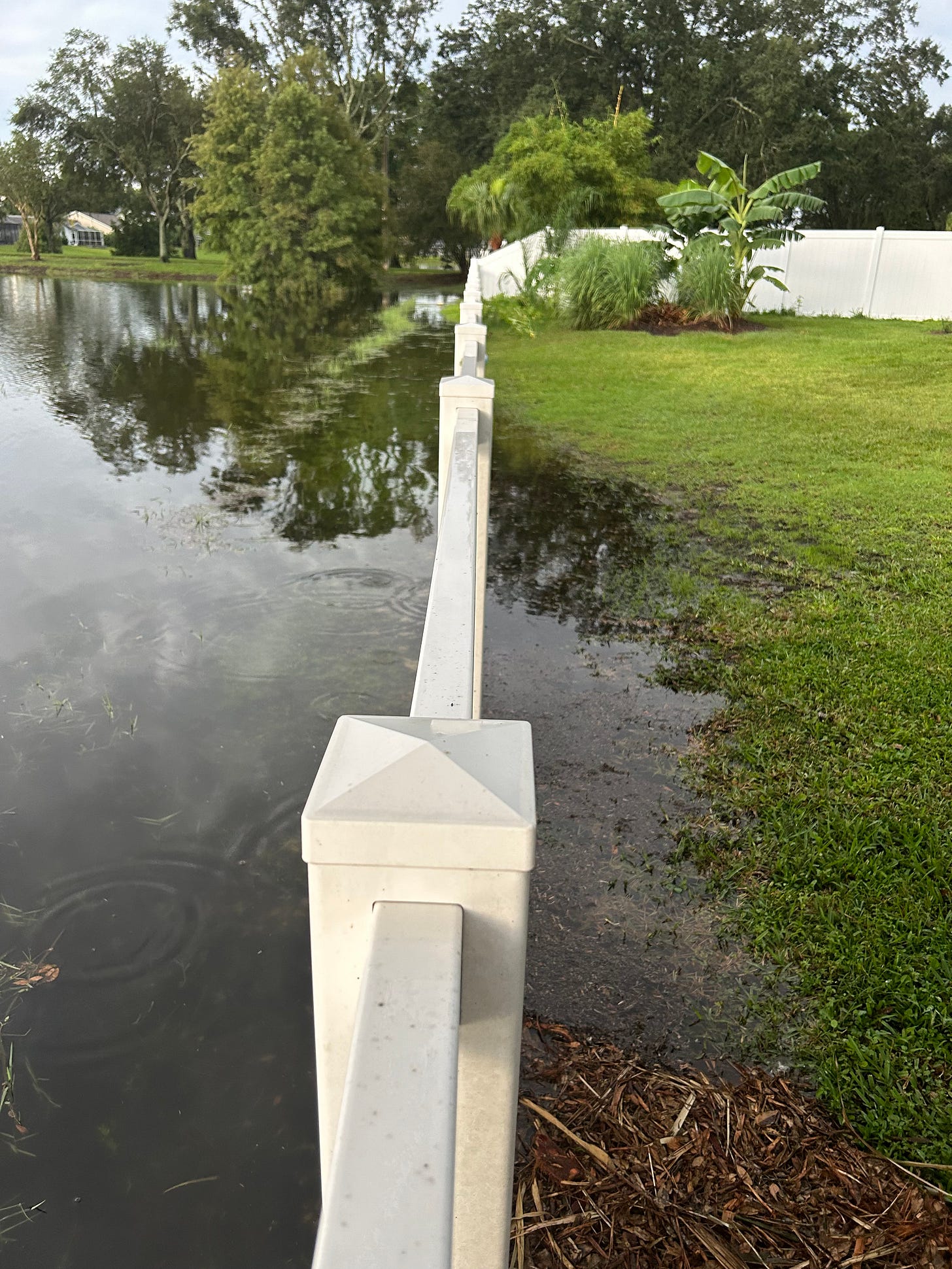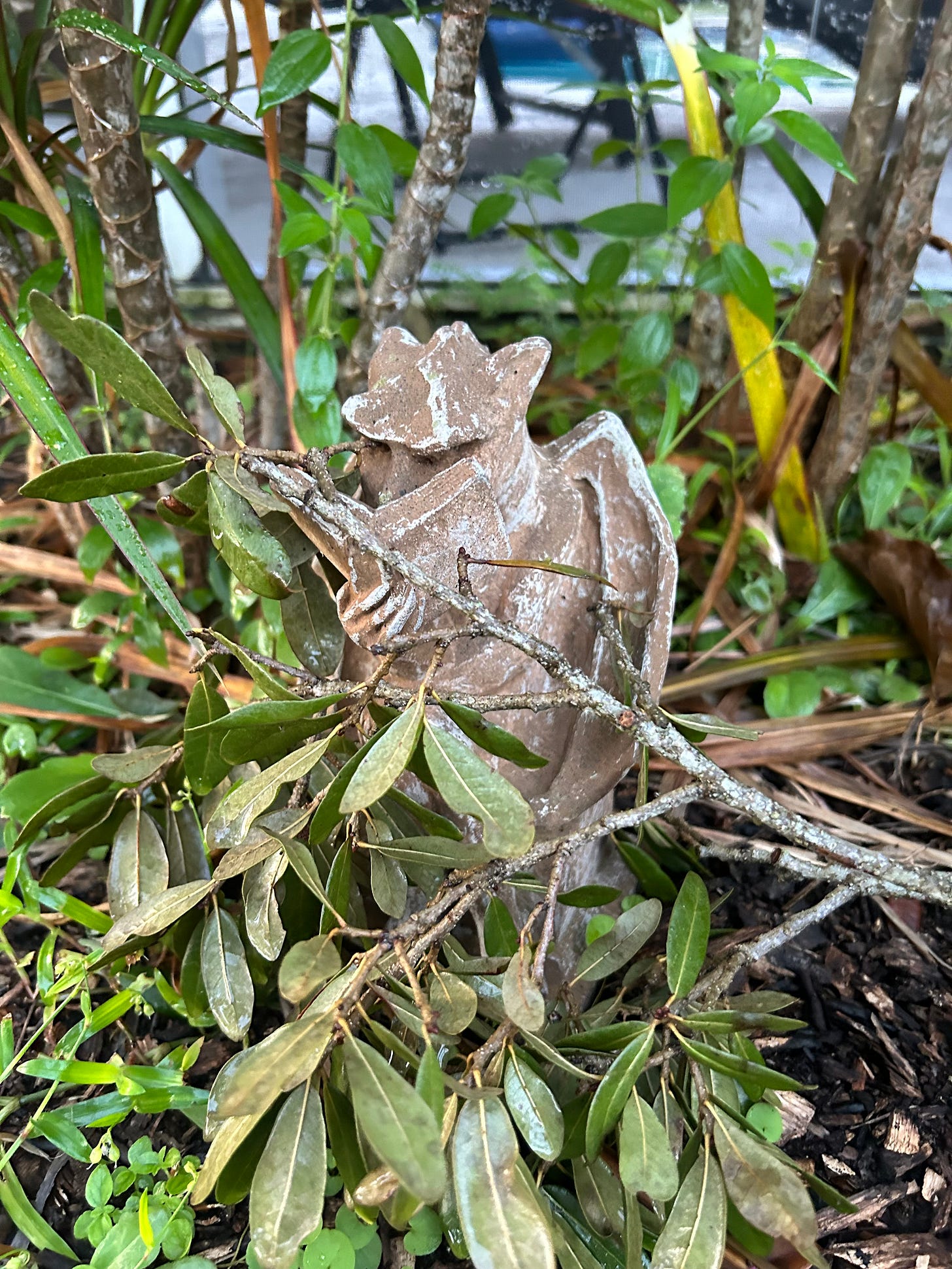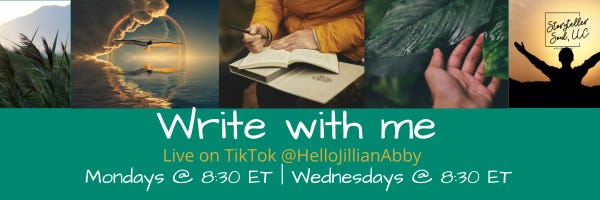The Before and After of Hurricane Helene
And how Americans learned to get along for the time being.
Hey there, friends and family. If you’re in the southeast United States, chances are you or someone you know has had a really rough week with the arrival of angry Aunt Hurricane Helene. This blog is not to make light of what has been an awful situation for so many of my friends and family in the Tampa Bay Area and beyond— it’s to shed light, spread light, and shine light on what happened over the past several days.
There is no doubt that this storm was awful and caught even the most seasoned storm-riders off guard. People who have lived in their homes for decades without much problem have suddenly found themselves wondering if that’s where they want to continue to be (or if that’s even an option). There is so much heavy around, but also so much light.
For a moment, I could hear the heartbeat of this country again.
Hurricanes are the bad kind of weird
For anyone who has ever gone through a hurricane, you know that the days leading up to the storm are absolutely bizarre. Hurricanes are unlike a tornado in that you have far more warning about it. Hurricanes are unlike a blizzard in that there’s so much uncertainty about where it’s going to hit.
Hurricanes feel like several days of being in panic purgatory… do you stay, do you go, do you prep, or do you think you can make do with the BOGO jars of Jif you grabbed from Publix and that can of hurricane beans you bought back in 2016? And we all stalk Denis Phillips’s Facebook page for regular updates on what it all means and what to do next.
Preparing for a hurricane is like planning a party for that one friend who always RSVPs “Maybe” to everything. You’re never sure if you should go all-in, or just take care of the most important stuff in case it happens. For me, that means wandering from room to room in my house and figuring out what I would want to go in my car or go-bag if we had to leave.
The Only Things Certain In Life
There’s a strange benefit to hurricane and death— they give you short-term clarity on what matters. This week on my social media, I happened to catch a video of a graduation speech. I don’t have much context around it. It could have been a doctor giving the speech and/or he could have been giving it to medical students. Or maybe they were accountants. Regardless, the message would have resonated the same.
He shared that he has been bedside with many people in their final days and hours of life. At that time, nobody is asking to see their diplomas or their trophies. Nobody asks for their bank statements or how their stocks are performing. They didn’t care if their credenza was dusty or if their shoes weren’t perfectly organized in their closet. They didn’t care about their makeup or how cut their abs were.
In people’s final moments, what is important to them is almost always the same— they want to be surrounded by the people they love. They wanted to be with what mattered most to them—the connections they held deepest.
I found the same to be true in preparing for the hurricane. I wanted to have my family and pets with me. If we had to leave, I wanted to stay with the friends I was closest with. I wanted to check on those dear to me who were also in the way of the storm, and I really appreciated every single person who thought to check on me. It was this weird combo of feeling such warm fuzzies of love, while also feeling sick to my stomach at the uncertainty ahead.
Jen and I found ourselves taking the time to secure our garden as much as possible and preserve the items on our patio, our happy place where we have coffee with the sunrise every morning. I took an inventory of where my favorite printed photos were and bagged up our essential paperwork. And then I looked around at everything else and shrugged.
It sucks to lose anything, but you can’t save everything. Did our cooling duvet cover matter more than our mango wood nightstand? Would I be happier if I saved a suit jacket or my best pair of sweatpants? What would be replaceable and what wouldn’t? How would I feel if I didn’t have it the next day? I felt like I was on my deathbed, shrugging and thinking, “I just want my people.”
Easy for you to say
I’m reticent to even write on this topic because the truth is our family and home were safe. And dear friends of ours just a mere 10 minutes away were not so lucky. I do not know what it feels like to wade through water as your belongings float around your ankles. I saw many people crying as they dumped what appeared to be nearly every furniture item from their homes.
But I get the sense that the tears weren’t for the actual couch or Ikea lamp.
The tears were fear, exhaustion, grief, and overwhelm. They were tears of “How the heck will I rebuild? How will I afford to rebuild? Do I even want to be here anymore? It doesn’t feel safe.”
I realized that while the individual value of items maybe didn’t matter, losing them all at once absolutely did. It felt like a violation. And with those items went years of memories that came with curating each piece. Even the Ikea lamp had a story.
And my mind went to Gaza, Afghanistan, Ukraine, and so many other places in the world where people were also having life as they knew it ripped away from them. It was a feeling of universal pain.
It was also a reminder that we are so lucky in the US. The storm has passed. We have insurance, FEMA, the SBA, the Red Cross, and so many more government and non-profits to help. We have the National Weather Service and other organizations to keep us apprised of future storms. And many of us are working hard to preserve our rights to freedom, safety, bodily autonomy, and religious autonomy so that we do not have another loss to grieve.
One silver lining
The calls for help were immediate, both during and after the storm. “My grandmother is trapped!” “Our roof just blew off and water is coming in everywhere!” “There is a car fire in our parking lot!” Across social media, people posted desperately seeking help and answers.
And almost equally as fast, came the responses. One networking group I belong to, St. Pete Girl Bosses, and its wonder-of-a-founder, Sandy Bean, mobilized immediately to play need/service matchmaker. People could (and still can) submit what they need or how they can help.
As the sun came up over Tampa Bay and the clouds cleared, we all began to assess the damage and mobilize. I didn’t see a single request for help that said, “I need help— but only if you’re cisgender or straight.” I didn’t see offers for support that said, “For Democrats only” or “For Republicans only.” We didn’t question race or country of origin when it came to accepting food from the local restaurants and food trucks. We didn’t care about someone’s beliefs or lifestyle when it came to giving or receiving help.
For a moment, America felt like that idealized America dream and it was really nice.
Can we hold on to this?
I would hope that through this tragedy, we in the US can all remember how important our people, our neighbors, and our communities are. I hope we can pull from this that we can handle the seemingly impossible when all of us are included, not just some. We’ve all existed through the worst, even with our differences. There was space for all of us and we are better for it because we’re not all the same.
I hope we also learn that everyone needs a “handout” sometime. That our people and communities can grow better, and faster with the right kinds of support. I have not heard a single person in our community tell another to “pull yourself up by your bootstraps” in this tragedy. We know that help is needed and deserved, and we will all be better for it the faster we can help everyone get back on their feet.
Because at the end of the day, it’s people that matter most. In the stages of our lives that are most precarious, most worrisome, or most time-sensitive— it will always be about the people. The storm may have passed, but I hope that feeling remains.
Ways to help if you’re local:
Donate cleaning supplies, gloves, masks, box fans, dehumidifiers, garbage bags, paper towels, disposable food items (plates, silverware, cups)
Wash and dry someone else’s laundry
Buy grocery and restaurant gift cards
Lend a car. Lend a bedroom. Lend a generator.
Watch a pet. Babysit a child.
Buy from local restaurants and businesses that lost revenue (and some lost so much more).
Donate money to organizations and directly to people. (Like to my dear friend, Rachel Stone, who I talk about in my book, Perfectly Queer)
Don’t drive through neighborhoods just to film or assess the damage. Do not add to the traffic and crowding of these areas if you’re not doing relief work.
Ways to help if you’re not local:
Donate money. Even $5 or $10 from individuals can end up making a huge difference.
Look out for needs in the weeks and months after the storm as these people & families rebuild. Many are creating Amazon wishlists of things they need to replace.
Check in. Offer a space for the people affected by the storm to vent. Sit with them (virtually) in their grief and processing.









This is so well written.